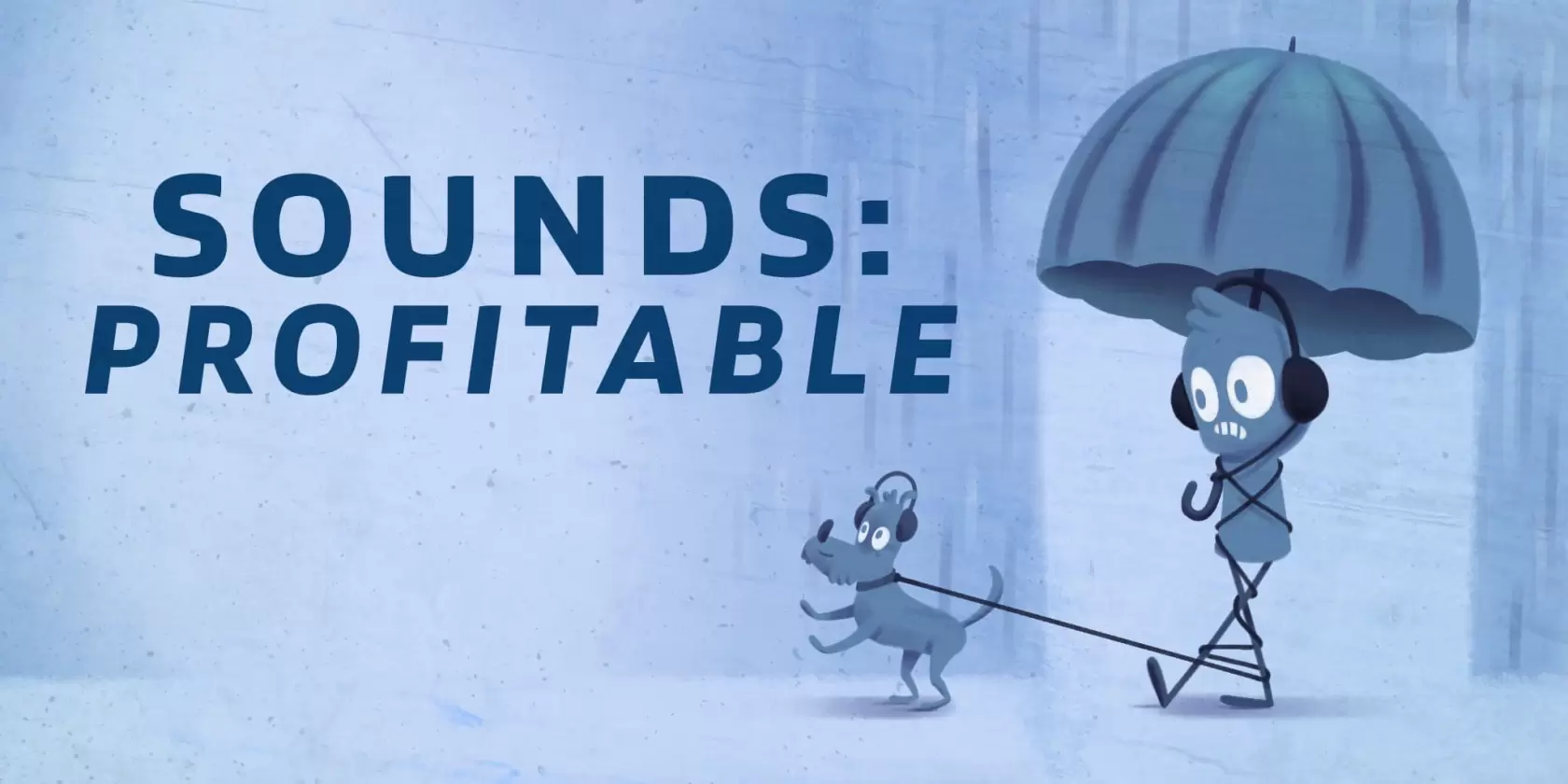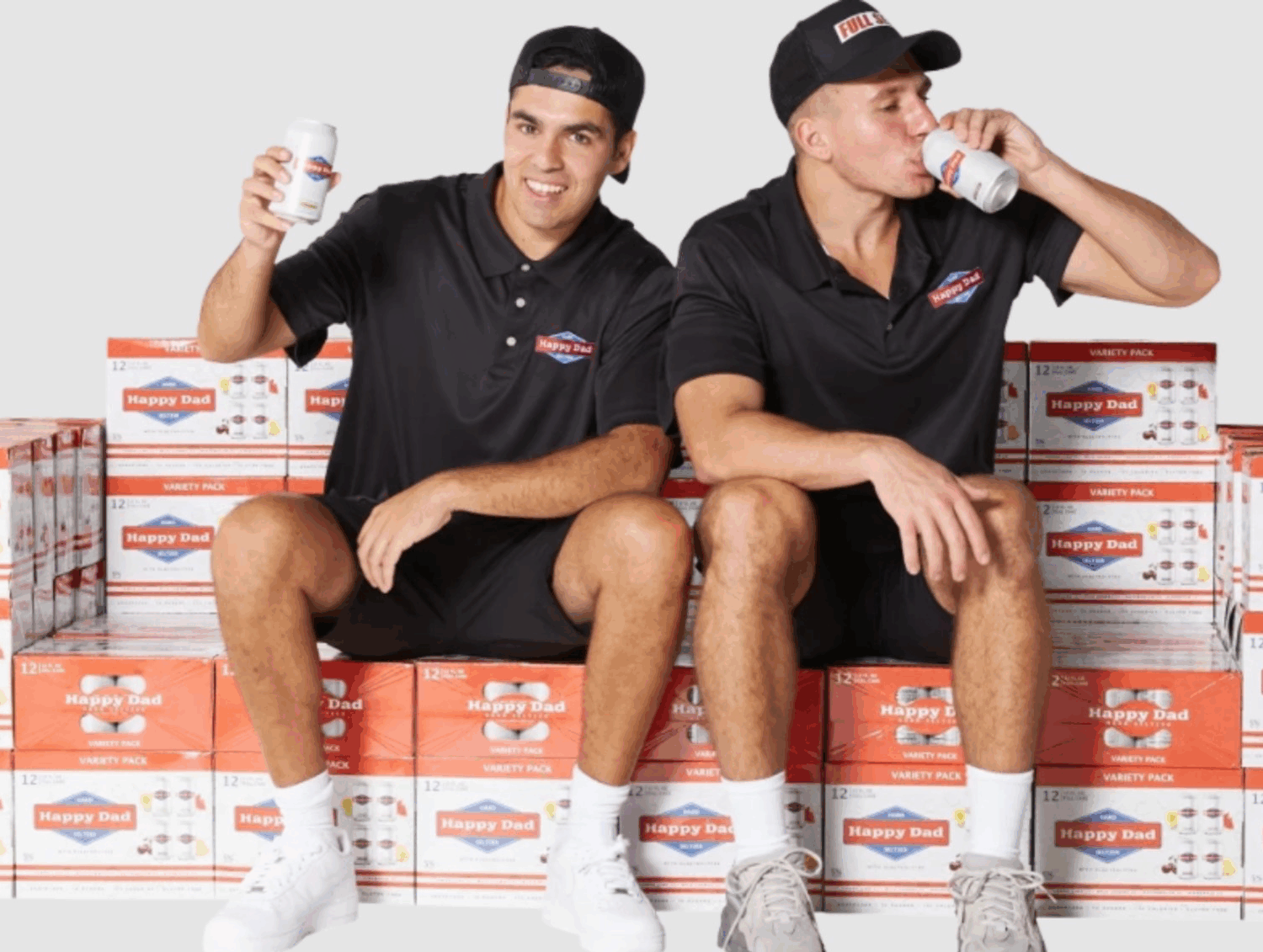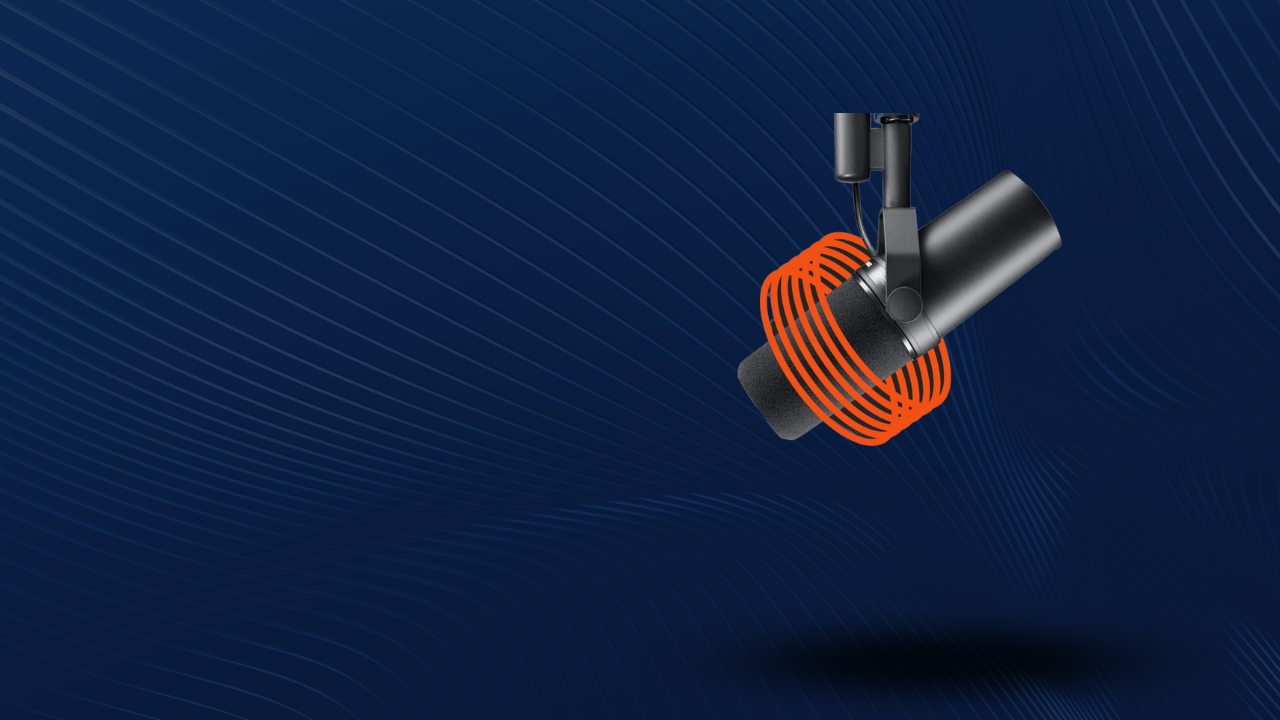Did you miss the biggest news stories for people in the business of podcasting? Check out The Download from Sounds Profitable, where we covered beer getting into video podcast advertising, why the kids podcast business is booming, and an appeal to private marketplace deals over FAANG
Sounds Profitable the Podcast kicked off just over one year ago this month, and it’s been an absolutely eye-opening experience. We started the podcast with three main goals:
- To be a testbed for amazing podcast adtech
- To provide hands-on accounts of how podcast adtech and advertising actually work
- To reinforce that everyone working in the podcast field, in any capacity, absolutely needs to understand the entire process of operating a podcast.
And let me tell you, this was some of the hardest work I’ve ever done, and I’m not even the one handling the production or editing. I’ve learned an incredible amount, from pushing the limits on the amazing adtech our sponsors Whooshkaa and Supercast provided, to figuring out what actually makes a good podcast and just how bad things can turn out when you “just wing it”.
Now, one year later, we want to make some changes. From the format of the shows, to the adtech, to the sponsoring partners, and everything in between. And in that process, we want to share with you what we’ve learned.
Just the Stats
The flagship of Sounds Profitable absolutely continues to be the newsletter, passing over 4,000 subscribers in just 18 months, but the podcasts have been no slouch either.
Since launching at the end of January 2021, we’ve had just over 23,000 downloads, with 19k coming from our public feed on Whooshkaa and 4k from our free premium feeds on Supercast. Our top ten episodes averaged 390 downloads per episode, with a high of 562 and a low of 323. And while those numbers aren’t exactly monetizable through CPM based advertising, they are incredibly impressive when you think about the incredibly niche nature of the content.
Partnering with Supercast also gave us the opportunity to directly identify how many people we could drive to sign up for additional content, like our narrated articles in English and Spanish, along with Up Next: A Podcast Upfront and The Podscape Podcast.
Sounds Profitable Premium Feed
- 176 total subscribers / 149 active subscribers
- 3,688 unique downloads
Up Next: A Podcast Up Front
- 243 total subscribers / 212 active subscribers
- 1,135 unique downloads
**The Podscape Podcast** 177 total subscribers / 107 active subscribers 324 unique downloads
What Did We Learn
With our stats fully on display, I wanted to share a few key learnings before explaining the upcoming changes.
Tech Demos Are Hard to Maintain
The original version of the podcast had 14 pieces of dynamic content. Ian worked painstakingly to match a break in the music to where the ads would pop in, so it all felt seamless. To nearly all of us, it was seamless, but the reality was that by setting that many points of dynamic content, we made it impossible to innovate. We also bloated every single episode with upwards of 5 minutes of content that got pretty annoying to followers. So, we’ll be testing out new adtech strategies through bonus episodes, displayed prominently, but not on the weekly content.
Niche Means Quality Over Quantity
While writing down these numbers, my first thought was “wow, those are so low”. But just like the newsletter, when I look through the email addresses of the people who sign up for the premium feed, what I find is that the audience I’m expressly trying to reach are the people signed up for Sounds Profitable content. That target is those working directly in the business of podcasting in a professional capacity, ranging from the adops, sales, and account managers, all the way to CEO’s and investment firms. Niche content produces niche numbers, but absolutely drives an engaged fanbase.
All Audiences Are Tough to Motivate
In the course of the year, we’ve had premium feeds and listener surveys, meant specifically to provide Sounds Profitable’s audience the option to experience the listener side of products and offerings they were considering asking their own audience. I optimistically believed we would see higher-than-average numbers for both, but what we saw instead was the exact benchmark anyone should expect. That doesn’t mean I won’t keep asking all of you to buy into these experiments, it just means that even a niche audience may not respond any better than the norm.
Content Accessibility
Even with making the content through Supercast completely free, it has been incredibly difficult to get people to sign up. If you want people to engage with your content, it needs to be in as many places as possible, where the audience wants to search, and not just where you want to provide it.
What’s Next
As of today, Sounds Profitable has fully migrated off of Whooshkaa and Supercast. Both Whooshkaa and Supercast been fantastic sponsors (with Whooshkaa still onboard as a sponsor) and have provided me the opportunity to learn their platform inside and out.
Now, it’s time to learn another major hosting platform inside and out, Triton Digital’s Omny Studio. Omny offers an incredible number of features that I’m excited to push to the limits. I’m specifically excited by their hosting platform and ad server being two separate products and how they approach feed creation and programmatic advertising. You’ll definitely be seeing some interesting experiments this year, powered by their tools.
But what about the shows?
Our core show, released every Sunday, has been renamed to Sounds Profitable: Adtech Applied, hosted by Arielle Nissenblatt and myself. Our focus stays the same since Arielle came onboard: speak with incredibly talented people and apply their knowledge to the podcast industry through the lens of adtech. As always, I’ll overcomplicate things and Arielle will make sure it’s palatable.
Our narrated articles, in both English and Spanish (powered by Veritone’s MARVEL.AI) are also available directly as well and our aim is for them to be released at the same time our newsletters go out.
And our latest show, The Download from Sounds Profitable, which got a fantastic response from all of you, finally has it’s own RSS feed. This show covers news for the business world of podcasting that you need to know and why, every Friday at noon EST in 10 minutes or less. And more importantly, it has two new hosts and a dedicated writer. I’m proud to announce that Manuela Bedoya of LWC Studios and Shreya Sharma of Inside Podcasting are your hosts, with Gavin Gaddis as your writer.
Both Up Next: A Podcast Up Front and The Podscape podcast are also available without needing a private feed. And we’ll have even more news soon about this years Up Next.
We’re also prioritizing two other avenues for hosting our content. One being Youtube, which we’re in the incredibly early stages of figuring out. But providing our Deepdives and all our podcast content on a platform that’s starting to prioritize podcasting and one with incredibly SEO potential, seems like a home run.
The other is Sonnant, a tool built to get a better grasp on the audio and video content you make, classify it correctly, and be able to quickly share it through clips and playlists. We’re starting to prioritize tagging and associating our written content, but without a tool like Sonnant, it would be nearly impossible for us to reference everything Arielle and I have covered in the podcast, or that’s come up in a guest interview, or on The Download, so this is going to be exciting to put to use.
Wrapping It Up
Podcasting is incredibly difficult, but having the experience with these partners and the process allows me to better cover this industry. I don’t care what your role is, you need a podcast. You need a solid mic, an idea, and time to make it happen. Use it internally to share knowledge at your company. Use it as a way to sell to your clients. Heck, make a podcast with your kids just for fun.
There are lots more cool things coming this year from Sounds Profitable. Please make sure to check out our podcasts, follow them on your favorite app, and most importantly, share them with your friends and colleagues.
Rel’s Recs
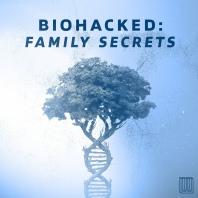
Arielle Nissenblatt of EarBuds Podcast Collective this week has chosen BioHacked: Family Secrets from Three Uncanny Four, hosted by Megaphone and measured by Chartable.
This podcast will grab you from the first sentence. BioHacked: Family Secrets gets to the core of the fertility industry and its major flaws. If someone donated sperm in the 1980s…hundreds of times, they could very well have dozens and dozens of biological children at this point. And in the ’80, they couldn’t have possibly predicted the advancement of DNA research and the rise companies like 23 & Me. That’s what this show is about. The children of sperm and egg donors are beginning to find each other and they want to know about their biological parents. What — if anything — do these (once anonymous) donors owe their offspring? Fun fact: I actually accidentally listened to this show out of order and it was still absolutely gripping.
Market Insights with Magellan AI
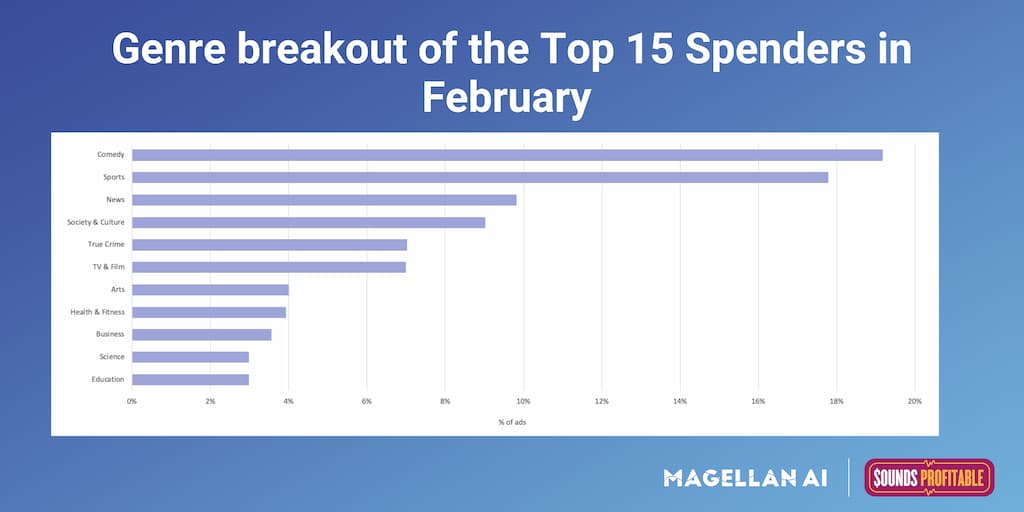
Last week we released our Top 15 Spenders list for the month of February. Across those top brands we estimate they spent $36mm cumulatively, 18% of all the spending we tracked during the month. This week we dove into which genres that spending was being allocated on. We found that the 15 top brands advertised on 53 different genres during the month February, but 70% of the ads they ran were on the just 6 genres. Additionally, the 42 genres not shown in the graph contained 13% of the ads they ran.
Stay up to date with top spenders and top movers and shakers in Magellan AI’s blog.
Anatomy of an Ad with ThoughtLeaders

What makes a good podcast ad? You know it when you hear it, sure. But is there more to it? We’ve teamed up with ThoughtLeaders to break down what works, what doesn’t, and what it takes to make great ads.
This week’s Anatomy of an Ad breaks down a host-read ad for Liquid IV presented by Brett Merriman and Sally deFries, hosts of The-Mail In Podcast.
Find out what worked well and what could be improved upon as you work to make your own ad reads better.

